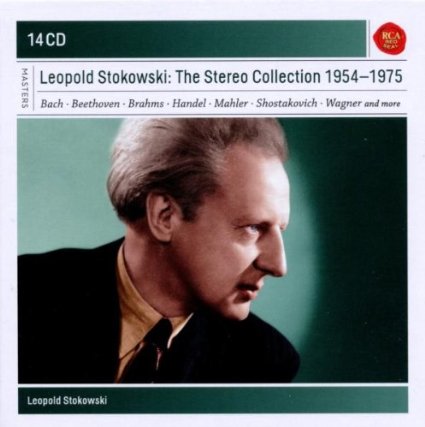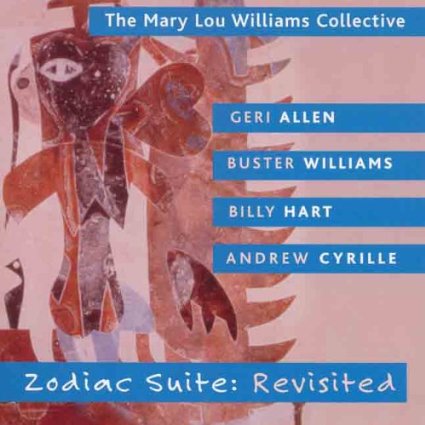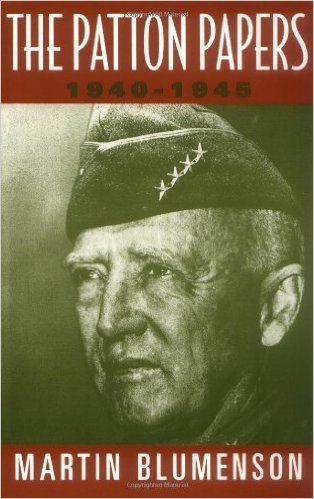-
Posts
13,205 -
Joined
-
Last visited
-
Donations
0.00 USD
Content Type
Profiles
Forums
Events
Blogs
Everything posted by Larry Kart
-

What Classical Music Are You Listening To?
Larry Kart replied to StarThrower's topic in Classical Discussion
The Elmendorff is on its way. -

What Classical Music Are You Listening To?
Larry Kart replied to StarThrower's topic in Classical Discussion
Thanks, I'll check. -

What Classical Music Are You Listening To?
Larry Kart replied to StarThrower's topic in Classical Discussion
Do you have any thoughts about which of the several packagings and possible remasterings is best, in particular EMI 2002 or the recent Warner coupling? And I do suggest that everyone check out Stokowski's Wagner, in particular his late '50s RCA album with the "Ride of the Valkyries" (with Martina Arroyo and Shirley Verrett and others adding immensely to the impact). His later London Phase Four Wagner album is a trip too, but I can see where many might find the Phase Four sonic spotlighting off-putting. The RCA Wagner material seems to be available only in the collection depicted below these days, but the old Wagner LP can be found in many used record stores. -

BALANCHINE - NYC Ballet In Montreal Vols1-5 (1954-1978)
Larry Kart replied to JSngry's topic in Recommendations
Thanks for the tip. Gotta get these. Way back when (pretty sure Balanchine was still alive) I saw the NYC Ballet do Stravinsky's Symphony in Three Movements at the Auditorium Theatre in Chicago. Early on there was a moment when much of the company suddenly advances toward the front of the stage in a wave or waves. I thought I was going to pass out it was so viscerally thrilling. -

What Classical Music Are You Listening To?
Larry Kart replied to StarThrower's topic in Classical Discussion
Don't quite follow you here. Whose pre-end-of-WWII broadcasts do you mean? Toscanini's? He sure wasn't conducting in Bayreuth in 1942. Furtwangler's? Didn't see anything at Berkshire that fit your description. -

What Classical Music Are You Listening To?
Larry Kart replied to StarThrower's topic in Classical Discussion
Toscanini's live "Tristan" Prelude and Liebestod, from 1952 I think. Surprisingly decent sound and the performance belies any notion of Toscanini as someone who cared only about orchestral precision (as he saw it) and sucked the blood out of the music. Precise he is here, but the sweep of the performance is overwhelming. BTW, spurred by an encounter with some Stokowski Wagner discs, I've been getting into "bleeding chunks" Wagner lately -- Reiner and Szell in addition to Arturo and Leopold. Very interesting journey so far. Szell, whom I would not have figured as a Wagnerian, delivered a superb "Siegfried's Funeral March," but his Prelude and Liebestod was a musical ingrown toenail. Anything else I should try to track down in the "bleeding chunks" area? Furtwangler's Wagner I already know. Klemperer? -
Have had that one for many years, It IS excellent.
-
Quite interesting, lively, if somewhat frustrating album, with Clark Terry, James Moody, Bunky Green, Albert Dailey, guitarist Ronald Prince, bassist David Williams, Elvin Jones, and percussionist Angel Allende. The pluses are that Moody is in extremely intense, adventurous form (I haven't heard every bit of Moody from the '70s onwards, but I've never heard him play better), Terry is pretty darn serious too, Green has his "off the chord" system working about as well he ever would on record (at least to my knowledge), and Dailey (on electric piano) is amped up, no play on words intended. Drawbacks are that Green only gets two solos (on the album's five tracks), Elvin is down in the mix, Williams is closely miked and too far up in the mix, and Prince, while not bad, gets too much solo space. Only about 39 minutes of music, too. Apparently not on CD; I found a used LP copy the other day. It would be nice if there were some unissued tracks; it seems nutty that this roster of players in generally top-drawer form should have left behind so little.
-
Just listened for the first time. On track #1 I had a brain wave that it might be Edwards featured with some semi-commercial white West Coast band of the time, like Si Zentner, with the band trying to be soulful. The trombone figures gave me that feeling. On track #3 -- maybe it's been guessed before; if so, I apologize -- Von Freeman?
-
"The Last Chronicle of Barset" is a killer, in the best sense. Mrs. Proudie!
-
Hey, I like the Shostakovich 15th myself.
-
I already knew I didn't like much Shostakovich -- exceptions for me are symphonies 1 & 5 and several of the song cycles -- bu in-person immersion in the Leningrad was something of a shock; previously I hadn't quite grasped the full experience of the work (if in fact I did). Expressing that shock by saying the next morning (with a detail or two) "what a horrible piece of music" seemed to me like a natural thing to do; I said the same thing to my wife at Symphony Center less than a minute after the applause died away. You're sure that I was "posturing" -- I think that perhaps you have a thin skin on some subjects. As for sharing enthusiasms, I do that all the time here -- e.g. my post the other day about that Geri Allen version of Mary Lou Williams' "Zodiac Suite." Another detail in the Leningrad -- hard to nail down without listening the whole work again, but I'll try. Early on in final movement there's a sweeping theme for all the violins (perhaps violas and cellos, too) which is presented divisi and in a slightly dissonant manner in a way I don't recall ever hearing before -- and this is, to be sure, a subjective response that also ventures into the realm of reading sounds per se as fairly explicit emotional tokens, although that I would say is something that even Shostakovich admirers find that his music does as a matter of course. In any case, the sweeping string theme in itself has a somewhat sorrowful lamenting tone to it, but the divisi semi-dissonant framing of it was (or seemed to me) to be almost explicitly tearful, as though Shostakovich were presenting us with something (the string theme itself) that was more or less sad or sorrowful in tone while at the same time the divisi semi-dissonant framing of that passage amounted to cue, even a virtual command, that we should weep over it. One knows or suspects what the primary source for such a musical/emotional device or tactic might be -- Tchaikovsky (also Mahler). But as a confirmed admirer of Tchaikovsky, I think that there's a fundamental musical and emotional difference between Tchaikovsky's procedures and those of Shostakovich, at least in the Leningrad. To quote a negative assessment of Tchaikovsky's Fourth from Carl Dahlhaus (which I think is accurate as far as it goes, though there is more to be said): "[F]or Tchaikovsky, the relation between lyricism and monumentality, so precarious to the symphonic order under 'late romantic' conditions, becomes an open contradiction. To have expressive cantabile themes culminate in bombastic fortissimo was not to resolve the dilemma but to conceal an admission of failure.... To put it bluntly, the grand style fundamental to the [symphonic] genre has been split into a monumentality that remains a decorative facade unsupported by the internal form .... and an internal form that is lyrical in character and can be dramatized only by applying a thick payer of pathos." I agree with Dahlhaus up to his "conceal an admission of failure" -- rather, I think it is the musical-emotional dilemma or contradiction that Dahlhaus speaks of that Tchaikovsky by and large seeks to and manages to dramatize; the undeniable sweeping pathos that one feels is one that the music itself, so to speak, also feels. It is not finally imposed on us externally nor is it "a decorative facade unsupported by the internal form." Yes, there is some significant divergence between internal form, such as it is, and lyricism cum monumentality that is unsupported by the internal form in Tchaikovsky's Fourth, but again that divergence between lyricism and monumentality unsupported by the internal form arguably is what the music itself speaks of with such power and, yes, pathos. Shostakovich in the Leningrad -- there the divergence between lyricism and monumentality is close to omnipresent but is (I think) scarcely even acknowledged in the actual workings of the music; one more or less gets chunks of lyricism and monumentality placed side by side, as though one were switching from a channel where a parade or scenes of combat or destruction are being shown to another channel where funerals and mass graves are depicted.
-
Pretty much knew what I was in for. We went because my wife Julie in her former life had worked for the Pittsburgh Symphony when Jansons was the conductor there, and she admired him as a musician and as a man (not that there's anything wrong with that). We joined the queue to say hello to him downstairs after the concert; he lit up when he saw Julie. I was introduced as "my new husband."
-
Perhaps if I had been through the siege of Leningrad, I might feel differently about the symphony, perhaps not. Of course, by "horrible piece of music" I mean IMO, though I did note that Bartok among other notable musicians found it browbeating/hollow/irritating, etc. at the time, and I offered at least one musical detail. I do "know better" for myself, as you do for yourself. As for the "stark" contrast between the "humility [of Leningrad siege survivors] in the face of the music" versus my "what a horrible piece of music," if I'm listening to a dirge or funeral march at what is (or amounts to) a memorial service for a million or more of my murdered comrades and relatives, I'm likely to have a very solemn expression on my face and sad, humble emotions in my heart. That is then a case-closed judgment of the value of the music that is being played?
-
Why patrician? Was Bartok -- he infused with Hungarian folk music -- less of the people, less down-to-earth than Shostakovich?
-
At Symphony Center: The Bavarian RSO under Mariss Jansons doing the Shostakovich 7th (Leningrad). Superb orchestra (the winds especially), handsomely conducted by Jansons, but what a horrible piece of music. You can see why an irritated Bartok parodied its near-endless first movement march in his Concerto for Orchestra. Listening hard after a while for some passage, any passage, that wasn't mechanical, bulldozing, and banal, I finally found one in the third movement, an organically flowing melody for the violas alone. It went for naught, but there it was.
-

Nat King Cole: His Musical Autobiography
Larry Kart replied to mikeweil's topic in Mosaic and other box sets...
A phrase I've always liked in this regard -- may have even come up with it myself, don't remember now -- is "music (or whatever art you wish) that withstands and rewards contemplation." A good deal of music (a la Ellington's "two kinds of music" remark) of the good kind doesn't do that very much; instead, it's more or less fully taken in (as arguably is the intent) in the act of confrontation/consumption. Other music (or whatever art you wish) turns out to withstand and reward contemplation. Of course, one man's act of immediate consumption is another man's act of contemplation, but even so, I think there is a general principle involved and one that isn't inherently snotty or an attempt to pull rank. Music of the other kind we can agree to forget about. -
Lucky to have stumbled across this previously-unknown-to-me gem yesterday -- Allen's version (with some additional material, including Herbie Nichols' "The Bebop Waltz") -- of Mary Lou Williams' "Zodiac Suite." Allen is in exceptional form, grounded rhythmically by Mary Lou's updated Swing Era-"modernistic" writing, and her partners (Buster Williams, Billy Hart, and on some tracks Andrew Cyrille) are too. Indeed, Buster, whose playing elsewhere has struck me as a bit self-indulgent at times, is quite remarkable here in terms of execution and compositional thinking. http://www.amazon.com/Zodiac-Suite-Mary-Williams-Collective/dp/B000E1MY7W
-
I love Haydn, but some day we (or something or someone out there) is going to turn on the Mozart light for you.
-
http://www.amazon.com/The-Patton-Papers-Martin-Blumenson/dp/0306807173/ref=pd_sim_sbs_14_1?ie=UTF8&dpID=514X8r1LJDL&dpSrc=sims&preST=_AC_UL320_SR200%2C320_&refRID=0K65CR979N5YW452VFY8 Absolutely fascinating self-portrait (letter, diaries, etc.) of a grandiose military genius cum semi-psychopath. Fascinating too because it's all contemporaneous -- one knows what's going to happen next/how things are going to turn out in the near and long run, but Patton as he's writing of course does not. Some very harsh judgments of Eisenhower, Mark Clark, Montgomery, etc. Patton's bits and pieces of anti-Semitism at first seem to be of his time and place, but in Bavaria right after the war it's much more than that. Jewish DPs are "vermin," and he says that we should have left it to the Germans to finish them off.
-

MLB 2016 Season Thread Of Discussions
Larry Kart replied to JSngry's topic in Miscellaneous - Non-Political
Saw some of it. Like much of Burns' output, it put me to sleep in short order. That whole panning over photos thing, plus the narrator's voice and much of what he says. ZZZZZ. -

What Classical Music Are You Listening To?
Larry Kart replied to StarThrower's topic in Classical Discussion
"The Sound of Stokowski and Wagner," a 1959 RCA Living Stereo LP, which I found today in very good shape http://www.amazon.com/SOUND-STOKOWSKI--WAGNER--SYMPHONY-AIR/dp/B008F0978I/ref=sr_1_6?s=music&ie=UTF8&qid=1460508141&sr=1-6&keywords=the+sound+of+Stokowski+and+wagner Composer-critic Robin Holloway, who knows his Wagner inside-out (he wrote the excellent book "Debussy and Wagner," among other things) has said that in his view Stokowski was THE Wagner conductor. Having listened to this disc, I believe him. The implicit synesthesia of Wagner's music is right there. -

What Classical Music Are You Listening To?
Larry Kart replied to StarThrower's topic in Classical Discussion
Darius Milhaud's "Protee," Maurice Abravanel, Utah Chamber Orchestra An almost-forgotten radical modern masterpiece -- not like most Milhaud, kind of a cross between "Le Sacre" Stravinsky (influence might have gone both ways there) and Varese, whose music Milhaud would not have known at the time. Would like to get my hands on this o.o.p. Monteux recording, though "modern" sound is probably essential. It's movement 2 that's the killer (it caused a riot at the premiere), though the whole work is remarkable. The premiere of "Protee" took place in 1920, but it was written in 1913, contemporaneous with "Le Sacre." -
Frank Baker is jazz DJ-record producer (VeeJay Records) Sid McCoy, the two militants in the Pageboy routine with Peter Bonerz are Muhal and John Jackson, both clearly having a good time. Robert Forster was so good.
-

What Classical Music Are You Listening To?
Larry Kart replied to StarThrower's topic in Classical Discussion
I like Rowicki's Dvorak symphony set. http://www.amazon.com/Dvorák-Symphonies-Overtures-Anton%C3%ADn-Leopold/dp/B0033KR5Z2/ref=sr_1_1?s=music&ie=UTF8&qid=1460165386&sr=1-1&keywords=rowicki+dvorak
_forumlogo.png.a607ef20a6e0c299ab2aa6443aa1f32e.png)




